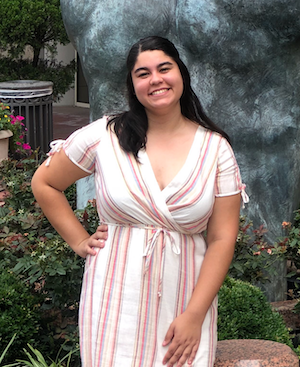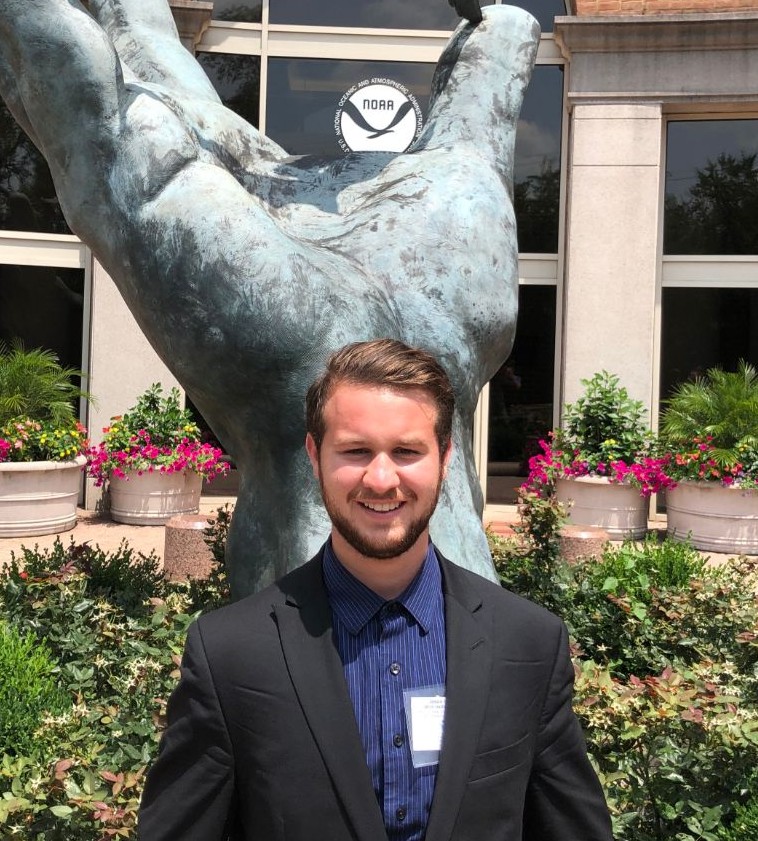News Information
- Published
- August 28, 2019
- Department/College
- Academic Affairs, University News
SEASIDE, Calif., August 28, 2019 -- Two CSUMB Marine Science students have been selected to receive scholarships from the National Oceanic and Atmospheric Administration (NOAA). The scholarship recipients, Jezella Peraza and Jason Gronich, were the only students selected from across the California State University system receive these awards.
SEASIDE, Calif., August 28, 2019 -- Two CSUMB Marine Science students have been selected to receive scholarships from the National Oceanic and Atmospheric Administration (NOAA). The scholarship recipients, Jezella Peraza and Jason Gronich, were the only students selected from across the California State University system receive these awards.
— CSUMB Marine Science associate professor, Corey Garza.These awards recognize Jezella and Jason's scholarly achievements and, their potential to one day contribute to the emerging needs of NOAA's future workforce."
Peraza and Gronich will both receive full funding from NOAA to support their last two years of academic student at CSUMB and receive funding to conduct summer research at NOAA research facilities.

Peraza during her internship at the NOAA Headquarters in Silver Spring, MD.
Jezella Peraza received the NOAA Educational Partnership Program with Minority Serving Institutions (EPP/MSI) Undergraduate Scholarship. She was one of 11 students chosen from around the U.S.
"I am humbled and honored to be one of the recipients of the NOAA EPP/MSI Scholarship. Receiving the award is so meaningful because it will not only help me with financial challenges, it will also provide me the experience I need to be successful," said Peraza. "The NOAA undergraduate scholarship program will provide me the experience I need to become an accomplished Marine Scientist. I can perform research and heighten public awareness by educating the public in marine conservation, enhancement of sea habitat and public policy, for the continuing benefit of humanity."
Jason Gronich received the NOAA Hollings Scholarship. He was one of 126 students from around the U.S. selected.
"Applying for the NOAA Hollings scholarship was by far the best decision I have made during the three years I have been at CSUMB. Along with the generous scholarship that NOAA provides to pay for my tuition, they also are providing me with plenty of resources to develop my professional skills and get involved with the marine science research I have always dreamed of doing," said Gronich. "Achieving this scholarship feels like such a wonderful reward for studying so vigorously over the past of couple of years as well as volunteering in various marine-related organizations."

Jason Gronich at the NOAA headquarters.
The Ernest F. Hollings Undergraduate Scholarship was established in 2005 in honor of Senator Ernest F. Hollings, who was well known for supporting ocean policy and conservation. Senator Hollings passed away earlier this year. The Hollings Scholarship includes a two-year academic award of $9,500 per year, and a 10-week, full-time, paid summer internship opportunity at any NOAA facility nationwide. Scholars also receive funding to present their NOAA research projects at two national scientific conferences. Students apply in their second year of undergraduate study and each must be a full-time undergraduate majoring in a NOAA mission field such as oceanic, environmental, biological, and atmospheric sciences, mathematics, engineering, remote sensing technology, physical sciences, social sciences, and teacher education.
The Educational Partnership Program with Minority Serving Institutions (EPP/MSI) was established in 2001 to support the education of postsecondary students pursuing degrees that directly support NOAA’s mission. The EPP/MSI Undergraduate Scholarship includes a two-year academic award of $9,500 per year, and two summer internship opportunities. Scholars also receive funds to present their NOAA research projects at two national conferences. Students apply in their second year of undergraduate study and must attend a minority serving institution. Each student must have and maintain a declared major in a NOAA-mission related discipline including, but not limited to, oceanic, environmental, biological, and atmospheric sciences, mathematics, engineering, remote sensing technology, physical sciences, including physics, geography and hydrology as well as social sciences.